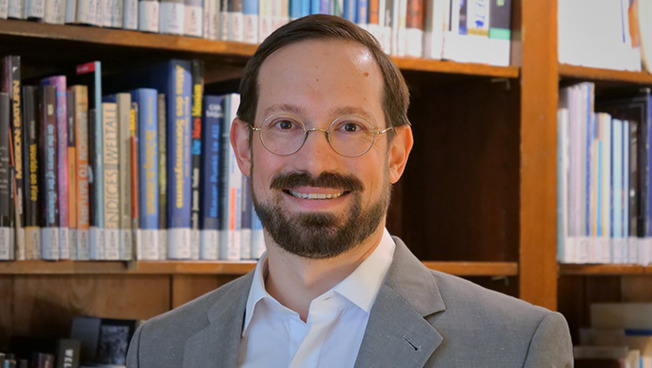23 August 2023
New Emmy Noether Independent Junior Research Group Studies Supermassive Black Holes

Photo: Universität Hamburg/MIN/Fuchs
Supermassive black holes are usually found in the center of galaxies and have a mass of more 100,000 suns. Astronomers believe that these black holes originate from massive stars in the early universe. The discovery of some of these objects with masses of billions of suns in the early universe—less than 800 million years after the big bang—poses a major challenge to the established theories of their formation.
“The goal of my Emmy Noether research group is to better understand the origin of these supermassive black holes and their early growth,” says Dr. Jan-Torge Schindler of the Hamburg Observatory in the Department of Physics at Universität Hamburg. “Our results thus shed light also on the formation of the first galaxies in the early universe. Hence, we are ultimately researching our cosmological worldview and examining whether and how individual existing theories and ideas intertwine.”
To answer these questions, the researchers are using large sky surveys, which take pictures of the sky at different wavelengths and search those images for matching light sources. Black holes may not be visible, but as they grow, they are surrounded by huge, hot disks of gas and dust. These can be observed at a distance as point-shaped light sources. The researchers then apply to large observatories for time to use spectroscopes in order to determine whether the light sources are actually the objects they are looking for from the early universe.
“Coinciding with my Emmy Noether research group, the Euclid mission was recently launched. Euclid is a space telescope of the European Space Agency (ESA) that will observe one-third of the night sky in the near-infrared range over the next 6 years," says Schindler, who also conducts research in the Cluster of Excellence Quantum Universe. “With no atmosphere in the way, we will get a very light-sensitive map of billions of galaxies, which will allow us to find growing supermassive black holes just a few hundred million years after the big bang. In addition, there is a high probability of discovering completely new objects also.”
To discover supermassive black holes even earlier in the universe, the junior research group is also using artificial intelligence and machine learning. For this purpose, they are developing datasets adapted to the new sky surveys in order to efficiently train existing methods.
“The offer of interdisciplinary research in machine learning—for example, in the Center for Data and Computing in Natural Sciences—was one of the many reasons why I decided to base my Emmy Noether independent junior research group in Hamburg,” says Schindler. “However, the main reason for coming to Universität Hamburg was the synergies in the field of extragalactic astrophysics. At the Hamburg Observatory, there is already expertise in galaxies, galaxy clusters, and cosmology. My research dovetails with that well— I bring a new topic that fits the existing topics very well.”
About
Dr. Jan-Torge Schindler studied physics at Kiel University, after which he obtained his doctorate in astronomy and astrophysics at the Steward Observatory at the University of Arizona in the United States. Following his doctorate, he worked as a postdoctoral researcher at the Max Planck Institute for Astronomy in Heidelberg and at the Leiden Observatory at the University of Leiden in the Netherlands. On 1 June 2023, he started his Emmy Noether independent junior research group at the Hamburg Observatory in the Department of Physics at Universität Hamburg. The funding amount of more than €1.7 million includes the program allowance for indirect project costs.
The Emmy Noether Programme
The German Research Foundation’s (DFG) Emmy Noether Programme gives exceptionally qualified early career researchers the chance to qualify for the post of professor at a university by leading an independent junior research group for a period of 6 years. The program is named after Emmy Noether (1882–1935), a German mathematician who is considered to be one of the founders of modern algebra. Numerous phenomena and theories are named after her.
